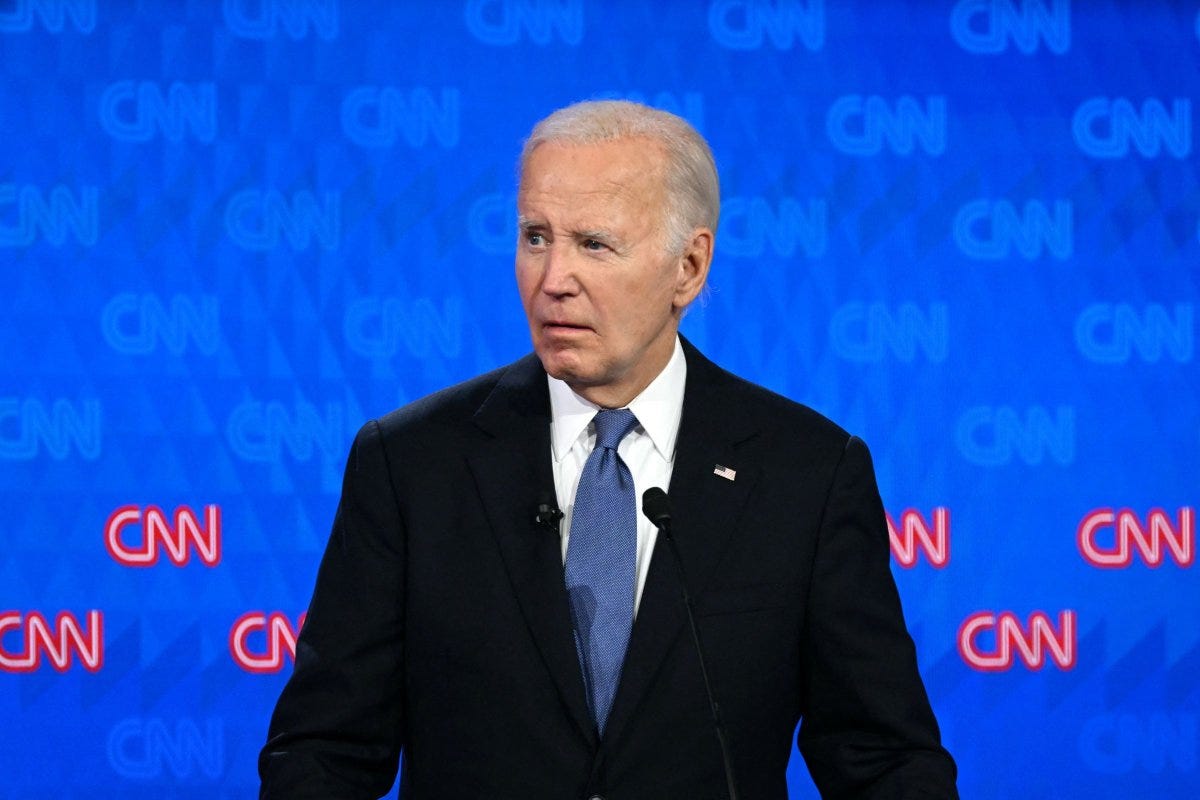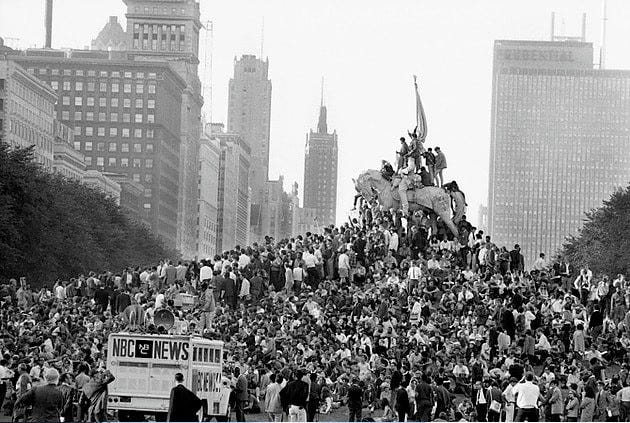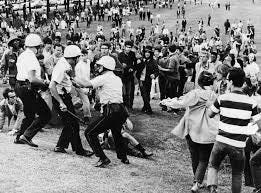One can't hardly turn on the network or cable news shows these days without hearing multiple pundits weighing in on whether President Joe Biden should fall back and allow a younger candidate to rise to the top of the Democratic Party ticket to face former Republican President Donald Trump this November.
As I wrote in this column last week, President Biden's debate performance was indicative of a senior statesman who has served his country honorably as a senator, vice president, and POTUS, but now has lost a step—literally and figuratively—and runs the risk of being soundly defeated this Fall.
President Biden during last week's debate
Yes, I know that the very next day in Raleigh, North Carolina, that Biden seemed stronger and more assertive while reading from the teleprompter an admission that his debate performance was below par.
But the debate fallout continues, not just from some Democratic voters who have expressed angst about whether Biden can get over the hump and defeat Trump, but also among the all important major donors class whose funds will be crucial as the campaign hits the home stretch.
Make no mistake, I plan to support the Democratic nominee and if that happens to be Biden, then so be it; the specter of "Project 2025" and the naked aggression that Republicans are planning to radically reshape how our federal government works is troubling to me, as was this week's conservative Supreme Court decision to grant the Executive Branch nearly absolute immunity for unconstitutional or arguably criminal acts that are committed in the course of a president's "official” duties. Trust, I don't want ANY president with that kind of power, regardless of whether said president is a Republican or a Democrat—nor should anyone with even the slightest modicum of common sense!
And while I plan to vote for the Democratic nominee knowing fully well that, God forbid, should Biden become totally incapacitated during a second term—or pass away in office—that the Constitution allows a transition of power to his Vice President (Kamala Harris), I would be less than candid if I didn't admit that whenever I read polling data that suggests that Trump is ahead at this juncture and only getting stronger, that the competitor in me understands the need for the Democratic Party hierarchy to have serious talks about replacing Biden at the top of the ticket next month during the Chicago convention.
The historian in me also understands that the Democratic Party has kind of sort of been here before—back in 1968—arguably one of the most turbulent years in 20th Century American history that led to a whole MESS at the Democratic Convention in, ironically, Chicago, Illinois!
The 1968 DNC Convention in Chicago was a nightmare and set the party back nearly a decade with regards to presidential politics…
As the 1960's drew to a close, Democratic President Lyndon B. Johnson, fresh off of signing the Civil Rights Act of 1964 and the Voting Rights Act of 1965 into law, further cemented himself in the annals of American history by implementing his "Great Society" program that led to the establishment of Medicare and Medicaid.
But by 1967, Johnson's sky high approval ratings started to wane as the war in Vietnam found nearly a million American service personnel, most of whom were drafted and disproportionately racial minorities, fighting and dying in Southeast Asia. Student protesters across the country rallied incessantly against the war, as did Dr. Martin Luther King, the 1964 Nobel Peace Prize winner who soon became a pariah among Democratic officials when he denounced the war effort in February of ‘67.
Dr. King's courageous dissent was later echoed by Robert Kennedy, the then Senator from New York who had served as Attorney General in his brother Jack's administration earlier in the decade. Interestingly enough, just the other day, I took some time to watch Kennedy's November 1967 appearance on the CBS News program "Face the Nation," where he admitted that he had been personally involved in some of the policy mistakes which led to America's growing military involvement in Vietnam, but that his conscience demanded that he criticize the extreme escalation on the watch of his brother's successor, President Johnson.
Both Dr. Martin Luther King and Sen. Bobby Kennedy drew the ire of President Lyndon Johnson in 1967 for criticizing the war in Vietnam…
While Kennedy stressed that November '67 morning that he planned to fully support Johnson's bid for reelection, in March of 1968—four months later—he formally announced his candidacy for the Democratic nomination! The tipping point very likely was the fact that during the intervening months, the Viet Cong and North Vietnamese Army had launched the deadly Tet Offensive in South Vietnam—a pyrrhic victory for the U.S. due to the massive American and South Vietnamese casualties but more crucially, an offensive that caused anti-war protests and rhetoric to rage at fevered pitches all across the United States.
American military personnel being treated for wounds during the deadly Tet Offensive in February of 1968…
Two weeks after Kennedy joined a Democratic Party primary roster which included Minnesota Sen. Eugene McCarthy and South Dakota Sen. George McGovern, incumbent President Johnson— to the surprise of many Democrats—announced on March 31, 1968 that he was no longer a candidate for the Democratic nomination! In words that still echo through space and time, Johnson said in a primetime speech, "With American sons in the field far away, I do not believe that I should devote an hour or a day of my time to any personal partisan causes or to any duties other than the awesome duties of this office. Accordingly, I shall not seek, and I will not accept, the nomination of my party for another term as your president.”
Four days after President Johnson's surprise withdrawal, Dr. Martin Luther King was assassinated in Memphis, Tennessee; a little over two months after his withdrawal, Robert Kennedy was assassinated in Los Angeles right after winning the California Democratic Primary; that August, the Democratic Convention was marked by violence inside and outside of the convention center in Chicago, with eventual nominee Hubert Humphrey (Johnson's sitting vice president) emerging only to lose the general election to Republican nominee Richard Nixon that November.
Historians will forever wonder what America would have looked like in the 1970's and beyond had Robert Kennedy, a stronger candidate than Humphrey with the appeal of his family name and nostalgia for his deceased presidential brother Jack, had faced Nixon in November of 1968? Would RFK have ended the Vietnam War more quickly? Addressed inflation and job losses more decisively? Eased the transition from a segregated society to an integrated society more seamlessly?
We will never know...
But what this historian does know is that there are certain similarities between President Joe Biden and former President Lyndon B. Johnson circa '68, particularly with regards to the discontent among a good number of Democratic and Independent voters whose turnout will be crucial come fall. Johnson followed his conscience and gracefully bowed out, but will Biden do the same, especially when considering that far too many Democrats and Independents don't seem all that enthused by potential successors like VP Kamala Harris, California Gov. Gavin Newsome, and Michigan Gov. Gretchen Whitmer?
We shall soon see...











Chuck, the conundrum is that I believe VP Harris as the replacement engenders an amplified anti-female (patriarchy), anti-black (well, you know) backlash from the conservative body politic that galvanizes them and ensures Trump's return to the White House. In light of the egregious SCOTUS decision, the political hellscape that awaits with the monarch weaponizing his position for personal and political vendettas is more than a little troubling.
I was there. Neither JFK nor RFK could have done for Civil rights what LBJ did. One the other fronts, Vietnam War, other issues, I am not certain. But, like Biden, LBJ KNEW the structure and workings of Congress BOTH sides of the aisles. JKF had very good ideas/ideals about a powerful, united USA, but like Obama, his overall knowledge of the people he was working with could NOT garner the Congressional backing her needed to get those laws passed. (That is the main reason JFK held this nose and selected LBJ as his VP ... he did NOT like him nor respect him.)
Biden is aware of ALL of this. He sees the hand off of the far-right in all of this. Trump is really just the evil, non-principled, ignorant "individual" that they need to mobilize a vicious cult to drink his kool-aid and move their agenda forward. But, he is savvy enough to steadily line his own pockets as he does their work.
In my opinion, Biden really had no plans to run for a second term. What for? He had satisfied his lifelong, political career goal at the top of the rung, while saving the Country from Trump. (The Dem problem was basically forcing him to select a Black Female (female period ... the country had shown they were not ready for this.)
At this point, no Dem up there has the political knowledge, integrity and character if Joe Biden. I REALLY hate he was put in the position of having to try to save the nation a second time, but NOBODY else can be prepped at this late date. The Dems have got to stop fumbling around on the checker board while the Repubs are playing chess. With a divided Dem Party, what do the Repubs have to worry about ???
This is the time for EVERY Dem in a leadership position to stand with Biden and have his back, front, sides, whatever. The NATION needs him to win. And he should NOT have to fight the doggone Party, Plus the Repubs/MAGA's.
Get OFF the checkerboard and get into the chess game. 🤬🤬🤬🤬🤬🤬🤬